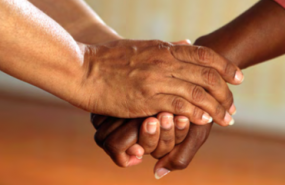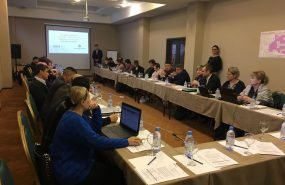Case study examines how Community, Rights and Gender Strategic Initiative has advanced Global Fund objectives
- 24.04.2019 13:14
- Post Views: 1,144
A newly released case study establishes the impact the Global Fund’s $15 million, three-year Community, Rights and Gender Strategic Initiative (CRG SI) has had building connections between key communities and advancing the Fund’s operational objectives.
The communities that benefited from this catalytic funding, including civil society and key affected populations, reported that through the six Regional Platforms supported by CRG SI, their knowledge of how to access technical assistance improved and they were better positioned to monitor the implementation of Global Fund grants. Nearly a third of the 146 respondents to a survey that formed part of the case study also reported meeting people from countries where they previously had no connections, increasing their capacity to coordinate and work with other communities in the region.
The case study, which was jointly created by the six regional CRG platforms, comes ahead of the Global Fund’s 41st board meeting, scheduled for May 15-16, where a decision will be made on catalytic funding priorities for the 2020-2022 allocation period.
“This case study is part of a broader, initiative-wide effort to have a more robust monitoring and evaluation-for-learning platform, inclusive of reporting, but also testimonials and case studies,” said Noah Metheny, who manages the CRG SI for the Global Fund. The point, he told the GFO, was “so that we can better document the impact this is having, specifically around better meaningful engagement of communities and civil society in Global Fund-related processes.”
The CRG SI, which spans the 2017-2019 allocation period, is designed to ensure that all people affected by the three diseases that are the focus of the Global Fund’s investments are able to play a meaningful role in the Fund’s processes, including country dialogue, funding-request development and grant making, implementation and monitoring. The CRG Strategic Initiative was preceded by the CRG Special Initiative, which was also a three-year, $15 million investment, that ran during the 2014-2016 allocation period.
The CRG SI has three components, which are designed to reinforce each other:
1. A short-term technical assistance program
2. Longer-term capacity development of key and vulnerable population networks
3. The six Regional Platforms for communication and coordination, which are based in Anglophone Africa; Asia-Pacific; Francophone Africa; Eastern Europe and Central Asia; Latin America and the Caribbean; and the Middle East and North Africa.
The organizations running the Regional Platforms have deployed a variety of forums depending on the needs of their specific communities. Some of the interactions were designed to foster sharing and learning among regional actors, while others have offered platforms for technical assistance providers to exchange experiences and improve coordination, timeliness and relevance of the assistance that they provide to communities.
The Platforms reported engaging a total of approximately 1,500 community members from 112 countries in 32 learning and sharing spaces over the course of 2018.
The new case study is the Platforms’ collective attempt to document how these efforts have advanced one of the key objectives of the CRG SI: To support strategic community capacity-strengthening initiatives by fostering spaces for engagement, collective participation and learning within key decision-making processes, in particular as they relate to community, rights and gender.
Utilizing a combination of reviews of narrative accounts of the Platform’s activities, an online survey that drew 146 responses, and in-depth interviews with four survey respondents drawn from different geographic regions, the case study authors set out to answer four key questions, beginning with:
1. How are communities using the new information and connections gained during Regional Platform learning and sharing forums?
The authors found that communities emerged with a better understanding of the funding process. And, ultimately, nearly half of the respondents – 47 percent – said the learning and sharing spaces organized by the Regional Platforms put them in a better position to monitor the implementation of Global Fund grants.
More specifically, 58 percent of the respondents accessed information on the providers of technical assistance in their regions, though only 37 percent said their organizations accessed technical assistance as a direct result of participating in one of the learning and sharing workshops. But more than half of respondents emerged with a better understanding of how to engage in the Global Fund funding model, and nearly half emerged with a better understanding of the Global Fund’s policies on sustainability and transition.
Gemma Oberth, a consultant for the Global Fund who coordinates the work of the six Regional Platforms, also highlighted the new relationships that were forged between organizations and participants who had not been aware of each other prior to participating in the learning and sharing workshops.
“A key mandate of the regional platforms is to improve the coordination of civil society, communities and technical assistance providers who are engaged in Global Fund-related processes,” Oberth told Aidspan. “Our case study found that almost a third of people who attended Regional Platform learning and sharing events met new people from countries where they had no previous connections. It is very exciting to be able to quantify how the platforms are enhancing linkages that strengthen Global Fund-support programs.”
2. How are the Regional Platforms’ engagement spaces contributing to key strategic objectives of the Global Fund strategy 2017-2022?
At its Board Meeting in April 2016, the Global Fund adopted four strategic objectives:
1. Maximize impact against HIV, TB and malaria
2. Build resilient and sustainable systems for health
3. Promote and protect human rights and gender equality
4. Mobilize increased resources.
Each of these strategies is supported by operational objectives and the case study demonstrated that the learning and sharing spaces have contributed to achieving several of those objectives.
Nearly a third of respondents said they emerged from the engagement spaces in a better position to introduce or scale-up programs that remove human rights barriers, which supports the third strategic objective. Additionally, 62 percent were better prepared to build stronger community responses and systems, in support of the second strategic objective. And 61 percent were better able to introduce or scale-up evidence-based interventions with a focus on key and vulnerable populations, which falls under the first strategic objective.
3. What is the unique value-add and catalytic effect of Regional Platform learning and sharing spaces?
The respondents in the case study underscored the significance of the learning and sharing spaces, with 94 percent saying they offered a unique opportunity for communities to engage with each other and 67 percent reporting that if the spaces were discontinued, the community response in that person’s country would be negatively affected.
4. How can the Regional Platform engagement spaces be evolved and improved going forward?
The opportunities to improve that the survey respondents proposed centered, primarily, on building more robust engagements that included more representatives from TB and malaria organizations and on offering more time to engage with Global Fund staff members.
But the key respondents underscored the need to continue developing new connections and facilitating even greater exchanges of information. They called for more discussions on how policy changes get implemented at a national level, and for even more details on technical assistance — including how to identify needs and draft requests for help.
“There is an importance in having reporting and case studies and a robust monitoring and evaluation for the learning framework in order to highlight this work,” Metheny said, “to allow the partners that were funding it to reflect on challenges and successes.” He also emphasized the importance of partners adapting their implementation strategies to the challenges and success that have been identified,” to really increase the impact that communities are having in Global Fund processes.”
The original source of the article can be found here.
Related News
Strengthening Community Engagement in Global Fund Processes through the Community, Rights and Gender Strategic Initiative
A Joint Case Study from the Six Regional Platforms for Communication and Coordination. Post Views: 0 Read moreDeveloping the capacity of CCM members representing civil society in Central Asia: a two-day workshop took place in Almaty, Kazakstan
On February 13-14, 2019 in Almaty, Kazakhstan, the Eurasian Harm Reduction Association (EHRA), within the framework of the Regional Communication and Coordination Platform project in the EECA region, with the support of the Global Fund, held a two-day workshop on “Developing the capacity of CCM members representatives civil society in Central Asia” for CCM representatives […] Read moreTBEC/EHRA Webinar Global Fund’s Community, Rights & Gender Technical Assistance Program
“Global Fund’s Community, Rights & Gender Technical Assistance Program” webinar to inform the participants about opportunities available for NGOs and CBOs from eligible countries in EECA region through the Global Fund’s CRG Technical Assistance Program so after the webinar they could be able to initiate the request for the TA in their countries. Post Views: […] Read moreServices for migrants and refugees from Ukraine – HIV/TB care with a focus on key populations
Due to the increasing flows of refugees from Ukraine because of Russia’s invasion of Ukraine, the EECA Regional Platform created a spreadsheet to fill contacts details of face-to-face and online services for refugees and migrants (with a focus on HIV/TB care and key population groups).
Regional Platform – EECA
This web-resource is a part of new regional communication and coordination project “Regional Civil Society and Community Support, Coordination and Communication Platform - EECA”, implemented by Eurasian Harm Reduction Association (EHRA).
Tags
See also
-
EECA’s Regional Platform monthly Newsletter #21, February 2026 26.02.2026 11:56
-
EECA’s Regional Platform monthly Newsletter #20, January 2026 27.01.2026 12:58
-
Global Fund Eligibility List 2026 27.01.2026 11:19







